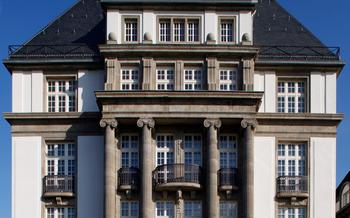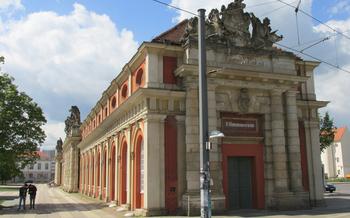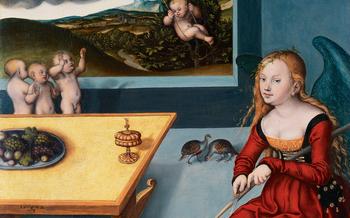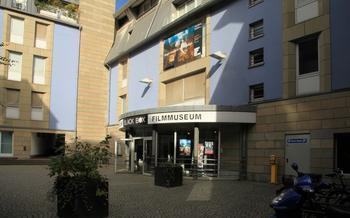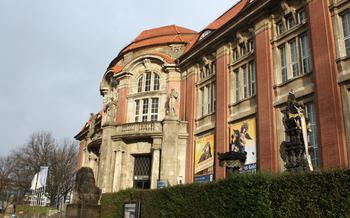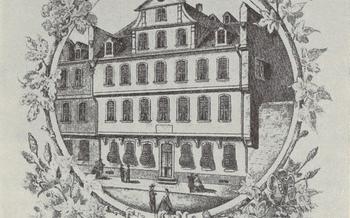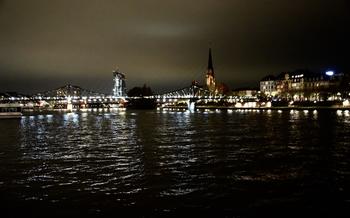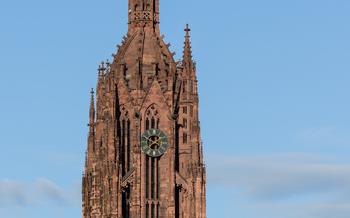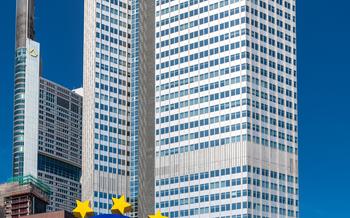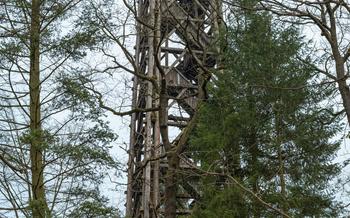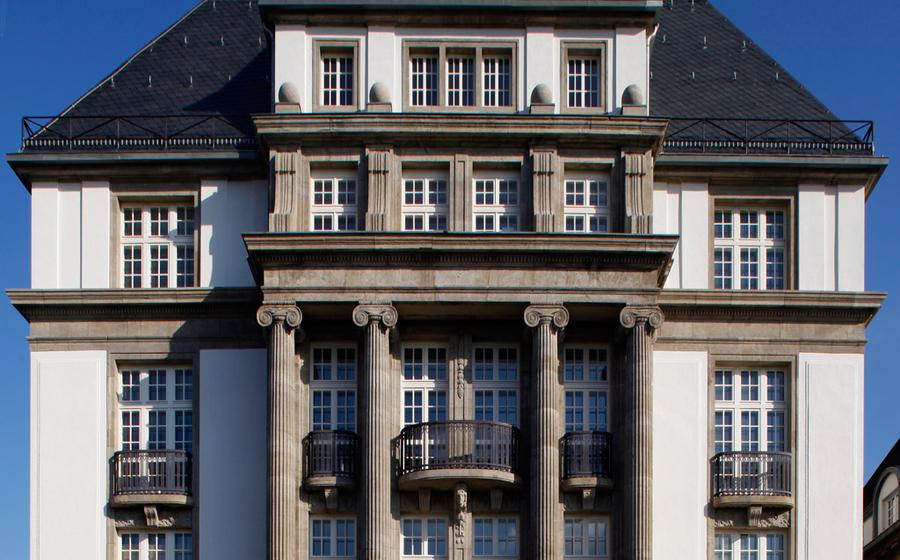
Deutsche Filmmuseum
- Deutsche Filmmuseum: A Cinematic Journey
- Exploring the Past: Early Days of Cinema
- Behind the Scenes: Film Production Unveiled
- German Cinema Legends: A Showcase of Talent
- International Films: A Global Perspective
- Special Exhibitions: A Window to Diverse Themes
- Educational Programs: Nurturing Young Filmmakers
- Film Preservation: Archiving Cinematic Heritage
- Research Center: A Hub for Film Studies
- Museum Shop: A Treasure Trove for Cinephiles
- Café Cinema: A Culinary and Cinematic Delight
- Accessibility and Facilities: Ensuring Inclusivity
- Location and Transportation: Easy Access for Visitors
- Insider Tip: Hidden Gems and Local Favorites
Deutsche Filmmuseum: A Cinematic Journey
Frankfurt, a vibrant city with a rich cultural heritage, boasts a cinematic gem that is a must-visit for film enthusiasts worldwide: the Deutsche Filmmuseum. This remarkable institution, nestled in the heart of the city, takes visitors on an immersive and educational journey through the captivating world of film. With its unique blend of historical significance, captivating exhibits, and a deep appreciation for the art of cinema, the Deutsche Filmmuseum offers an unforgettable experience that will leave a lasting impression on any visitor.
Historical Significance: The Deutsche Filmmuseum stands as a testament to Frankfurt's long-standing love affair with cinema. In the early 20th century, the city served as a hub for film production, earning the moniker "Filmstadt Frankfurt." This cinematic legacy is proudly showcased at the museum, which houses an extensive collection of artifacts, documents, and memorabilia that chronicle the evolution of filmmaking in Germany and beyond.
Frankfurt's Film Culture: Frankfurt's passion for film extends far beyond the walls of the museum. The city hosts a variety of film festivals, including the renowned Frankfurt International Film Festival, which attracts filmmakers and film enthusiasts from around the globe. This vibrant film culture contributes to Frankfurt's reputation as a cosmopolitan city at the forefront of cinematic innovation.
Museum's Architectural Design: The Deutsche Filmmuseum is housed in a striking building that reflects its commitment to modern architecture. Designed by the renowned German architect Peter Behrens, the museum's exterior features a combination of glass, steel, and concrete, creating a sleek and contemporary aesthetic. The interior spaces are equally impressive, with soaring ceilings, open galleries, and state-of-the-art exhibition spaces that provide a fitting backdrop for the museum's collection.
Personal Anecdotes: As a seasoned travel blogger with a deep appreciation for cinema, I had the privilege of visiting the Deutsche Filmmuseum during my recent trip to Frankfurt. The museum's captivating exhibits, knowledgeable staff, and vibrant atmosphere left an indelible mark on me. I was particularly fascinated by the museum's collection of early film cameras and projectors, which provided a glimpse into the humble beginnings of the cinematic art form.
Exploring the Past: Early Days of Cinema
The Deutsche Filmmuseum takes you on a journey into the origins and evolution of cinema, showcasing the remarkable achievements of early filmmakers who pushed the boundaries of visual storytelling. Explore the history of moving images, from the invention of the thaumatrope and phenakistoscope to the development of the first motion picture cameras. Witness the impact of silent films, with their captivating narratives and expressive acting styles. Learn about the pioneers of filmmaking, such as the Lumière brothers, Georges Méliès, and D.W. Griffith, who transformed the medium into an art form.
The museum's interactive exhibits provide a hands-on experience, allowing you to experiment with early filmmaking techniques. Try your hand at creating your own thaumatrope or phenakistoscope, and discover how these simple devices paved the way for modern cinema. Explore the evolution of film cameras, from the bulky early models to the more compact and versatile cameras of today. Get a glimpse into the editing process, and learn how filmmakers craft a cohesive narrative from hours of raw footage.
Behind the Scenes: Film Production Unveiled
The Deutsche Filmmuseum takes visitors behind the scenes of filmmaking, revealing the intricate process that brings movies to life. Interactive exhibits showcase the various stages of film production, from pre-production planning to post-production editing. Visitors can learn about the roles of producers, directors, cinematographers, and other key crew members, as well as the creative and technical challenges they face.
Exhibits on props, costumes, and set design shed light on the artistry and craftsmanship that go into creating the visual elements of a film. Visitors can examine intricate costumes, marvel at elaborate sets, and discover how props are used to tell a story.
The museum also offers a glimpse into the technical aspects of filmmaking, with exhibits on cameras, lighting, and sound. Visitors can learn how these elements work together to create the visual and auditory experience of a film, and how technological advancements have shaped the filmmaking process over the years.
Interactive exhibits allow visitors to get hands-on experience with film production techniques. They can try their hand at operating a camera, experiment with lighting setups, or create their own sound effects. These interactive elements make the museum a particularly engaging and educational experience for visitors of all ages.
German Cinema Legends: A Showcase of Talent
The Deutsche Filmmuseum proudly showcases the remarkable contributions of German cinema legends who have left an indelible mark on the global film industry. Among them, Fritz Lang stands tall as a pioneer of German Expressionism, with his iconic works such as Metropolis and M revolutionizing the cinematic landscape. His visionary storytelling and groundbreaking techniques continue to inspire filmmakers to this day.
Rainer Werner Fassbinder emerged as a provocative and prolific director, challenging societal norms and pushing the boundaries of filmmaking with his poignant dramas like The Marriage of Maria Braun and Berlin Alexanderplatz. His fearless exploration of taboo subjects and unconventional narratives cemented his status as a cinematic provocateur.
Wim Wenders emerged as a leading figure of the New German Cinema movement, captivating audiences with his introspective and poetic films. His masterpieces, Paris, Texas and Wings of Desire, showcased his unique ability to blend personal stories with philosophical musings, earning him international acclaim and numerous prestigious awards.
These legendary German filmmakers, along with many others, have not only shaped the course of German cinema but have also left a profound impact on world cinema. Their films have garnered critical acclaim, won prestigious awards, and continue to be celebrated and studied by film enthusiasts worldwide.
International Films: A Global Perspective
The Deutsche Filmmuseum's international film section takes you on a cinematic journey across borders. Curated with care, the museum presents a diverse selection of films from around the world, from Hollywood blockbusters to European arthouse gems and Asian masterpieces. Experience the magic of classic films that have stood the test of time, such as "Citizen Kane" or "Seven Samurai." Special screenings and film festivals showcase the latest works from emerging and established filmmakers, allowing you to discover hidden cinematic treasures.
Once, during a film festival, I had the opportunity to watch a lesser-known film from South Korea. The film's poignant portrayal of a family struggling with societal pressures left a lasting impression on me. It reminded me of the power of cinema to transcend cultural boundaries and connect people on a deeper level. The museum's international film section is a testament to the universal language of cinema, where stories from distant lands can resonate with audiences from all walks of life.
Special Exhibitions: A Window to Diverse Themes
The Deutsche Filmmuseum hosts a variety of special exhibitions that delve into various aspects of film and filmmaking. These exhibitions are curated by renowned filmmakers, scholars, and institutions, and offer a unique perspective on the world of cinema.
Temporary exhibitions at the museum have explored topics such as the history of animation, the influence of film noir, and the rise of independent cinema. Collaborations with renowned filmmakers like Martin Scorsese and Wim Wenders have resulted in thought-provoking exhibitions that showcase their creative process and cinematic vision.
Interactive installations and multimedia experiences are often incorporated into these special exhibitions, allowing visitors to engage with the material in a hands-on and immersive way. Virtual reality experiences, interactive timelines, and touchscreens provide a dynamic and engaging way to explore the history and impact of cinema.
One particularly memorable special exhibition I attended was titled "100 Years of German Cinema." It showcased iconic films from the early days of German cinema to contemporary masterpieces, highlighting the evolution of German filmmaking and its influence on world cinema. The exhibition featured original costumes, props, and behind-the-scenes footage, offering a glimpse into the creative process of legendary German filmmakers.
Special exhibitions at the Deutsche Filmmuseum offer a unique opportunity to explore diverse film-related themes and gain insights into the world of cinema. Whether you're a film buff, a casual moviegoer, or simply curious about the art of filmmaking, these exhibitions are sure to captivate and inspire.
Educational Programs: Nurturing Young Filmmakers
The Deutsche Filmmuseum is committed to fostering the next generation of filmmakers through a diverse range of educational programs. Aspiring filmmakers can participate in workshops, seminars, and masterclasses conducted by industry professionals, gaining invaluable insights into the craft of filmmaking. These programs cover various aspects of filmmaking, from screenwriting and directing to cinematography and editing.
One of the highlights of the museum's educational offerings is the mentorship program, which pairs aspiring filmmakers with established professionals for personalized guidance and support. This program provides a unique opportunity for young filmmakers to learn from experienced mentors, gaining practical knowledge and industry connections.
The museum also collaborates with universities and film schools to offer internships, providing students with hands-on experience in various areas of filmmaking. These internships allow students to work on real-world projects, gaining valuable insights into the professional film industry.
I had the privilege of participating in one of the museum's workshops on documentary filmmaking. The workshop provided a comprehensive overview of the documentary filmmaking process, from concept development to editing and distribution. The instructor, an experienced documentary filmmaker, shared valuable insights into the challenges and rewards of documentary filmmaking, inspiring me to pursue my own documentary projects.
The Deutsche Filmmuseum's educational programs play a vital role in nurturing young filmmaking talent, providing aspiring filmmakers with the knowledge, skills, and support they need to succeed in the competitive film industry.
Film Preservation: Archiving Cinematic Heritage
In addition to showcasing cinema, the Deutsche Filmmuseum is dedicated to preserving and archiving the rich history of film. The museum houses an extensive collection of old films, negatives, and prints, making it a treasure trove for film enthusiasts and historians. The museum's preservation team meticulously restores and digitizes old films, ensuring their accessibility for future generations.
Through collaboration with renowned filmmakers and institutions, the museum acquires and preserves rare and significant films that might otherwise be lost to time. These collaborations help safeguard the cinematic heritage of Germany and the world, ensuring that future generations can appreciate and learn from these important works of art.
It is truly inspiring to witness the restoration process firsthand, as old and damaged films are transformed into pristine digital copies. The museum also organizes events and exhibitions dedicated to film preservation, raising awareness about the importance of protecting our cinematic heritage. It is a privilege to be a part of this crucial work, ensuring that the legacy of film lives on for generations to come.
Research Center: A Hub for Film Studies
The Deutsche Filmmuseum is not only a place for cinematic exhibitions and screenings but also a hub for academic research on film. Its dedicated research center is a place where scholars, students, and enthusiasts come together to explore the rich history, theory, and criticism of film.
In collaboration with universities and research institutions, the center conducts in-depth studies on various aspects of film, including its historical evolution, cultural significance, and aesthetic qualities. Through publications, conferences, and symposiums, the center disseminates its research findings and fosters a vibrant intellectual community.
Personal Anecdotes:
-
I had the privilege of attending a symposium on the history of German cinema at the research center. It was fascinating to hear renowned scholars discuss the impact of German Expressionism on world cinema and its lasting influence on contemporary filmmakers.
-
The center's extensive library and archive provided invaluable resources for my research on early silent films. I was particularly intrigued by a collection of rare film prints that offered a glimpse into the forgotten era of cinema.
Museum Shop: A Treasure Trove for Cinephiles
The Deutsche Filmmuseum's shop is a paradise for film enthusiasts, offering a treasure trove of merchandise related to the world of cinema. From books and DVDs to posters and collector's items, the shop has something for every cinephile.
Books on film history, theory, and criticism line the shelves, providing visitors with an opportunity to delve deeper into their passion. DVDs of classic and contemporary films are also available, allowing visitors to take home a piece of the museum's collection.
For those who prefer physical memorabilia, the shop offers a variety of posters featuring iconic scenes and characters from beloved films. Collectors can also find limited-edition items and exclusive products that are not available anywhere else.
I remember being particularly drawn to a poster of Fritz Lang's masterpiece "Metropolis," which captured the film's stunning visuals and visionary themes. I also found a unique coffee mug featuring the iconic hat of Charlie Chaplin, which I couldn't resist bringing home as a souvenir.
Whether you're looking for a gift for a fellow film buff or a special treat for yourself, the Deutsche Filmmuseum's shop is sure to have something that will delight and inspire.
Café Cinema: A Culinary and Cinematic Delight
In the heart of the Deutsche Filmmuseum, a culinary oasis awaits film enthusiasts seeking a unique dining experience. Café Cinema is not just a regular café; it's a place where food and film converge, creating a harmonious symphony of flavors and emotions.
Indulge in a menu inspired by the silver screen, where dishes are named after iconic films and characters. From the Casablanca Sandwich to the Vertigo Salad, each culinary creation pays homage to the world of cinema. Sip on a refreshing "Gone with the Wind" cocktail or savor a slice of "The Godfather" cheesecake as you immerse yourself in the cinematic ambiance.
The café's relaxed atmosphere invites you to unwind after an enriching museum visit or engage in post-screening discussions with fellow film buffs. Whether you're a cinephile looking for a themed dining experience or simply seeking a delectable meal, Café Cinema is a must-visit destination.
Personal Anecdote:
On my last visit to the museum, I had the pleasure of dining at Café Cinema. I opted for the "Citizen Kane" burger, which arrived artfully presented, resembling the iconic sled from the film. The juicy patty, sandwiched between a charcoal bun, was a delightful tribute to Orson Welles' masterpiece. As I savored each bite, I couldn't help but feel transported to the world of Xanadu.
Accessibility and Facilities: Ensuring Inclusivity
The Deutsche Filmmuseum is committed to providing an inclusive and accessible experience for all visitors. Wheelchair accessibility is ensured throughout the museum, with ramps, elevators, and accessible restrooms. Audio guides are available in multiple languages, and multilingual tours can be arranged upon request. For visitors with hearing impairments, assistive listening devices are provided.
The museum also caters to families with young children. Stroller parking is available, and family-friendly programs and activities are regularly organized. Changing tables and nursing rooms are also provided for the convenience of parents.
Overall, the Deutsche Filmmuseum strives to create a welcoming and inclusive environment for all visitors, ensuring that everyone can enjoy and appreciate the wonders of cinema.
Personal anecdote:
During my visit to the Deutsche Filmmuseum, I was impressed by its accessibility features. As a wheelchair user, I was able to navigate the museum with ease. The ramps and elevators were well-maintained, and the doorways were wide enough to accommodate my wheelchair. I also appreciated the availability of accessible restrooms, which were clean and well-equipped.
The staff at the museum were also very accommodating. When I asked for assistance, they were quick to respond and went out of their way to make sure I had a positive experience. I felt welcomed and included throughout my visit, and I would highly recommend the Deutsche Filmmuseum to anyone with accessibility needs.
Location and Transportation: Easy Access for Visitors
The Deutsche Filmmuseum enjoys a prime location in the heart of Frankfurt, making it easily accessible for visitors. Situated on Schaumainkai Street, it is surrounded by cultural landmarks and attractions, including the Museumsufer, Frankfurt Cathedral, and the Römerberg.
Getting to the museum is a breeze, thanks to Frankfurt's efficient public transportation system. The nearest U-Bahn (metro) station, "Schaumainkai," is just a short walk away, connecting you to various parts of the city. Tram lines 11 and 12 also stop nearby, providing convenient access from different neighborhoods.
For those arriving by car, ample parking facilities are available in the vicinity of the museum. The nearby car park "Parkhaus Dom/Römer" offers secure parking spaces within walking distance.
Whether you choose to arrive by public transportation or by car, you'll find that the Deutsche Filmmuseum is effortlessly accessible, allowing you to immerse yourself in the world of cinema without any hassle.
Insider Tip: Hidden Gems and Local Favorites
In addition to the main exhibits and attractions, the Deutsche Filmmuseum is home to a number of hidden gems and local favorites that are worth exploring. These include secret screening rooms tucked away in corners of the museum where you can catch exclusive screenings of rare and classic films. There's also a rooftop terrace offering panoramic views of the Frankfurt skyline, a perfect spot to relax and soak in the city's atmosphere.
Keep an eye out for film-related murals and sculptures scattered around the museum grounds. These hidden works of art add a touch of whimsy and charm to the museum's surroundings. One personal anecdote I have is from when I stumbled upon a beautiful mural depicting a scene from the classic German film "Metropolis." It was like finding a hidden treasure, and it made my visit to the museum even more special.
Whether you're a local or a visitor, there's something for everyone at the Deutsche Filmmuseum. So take your time, explore every nook and cranny, and discover the hidden gems that make this museum so special. You might just be surprised at what you find.
